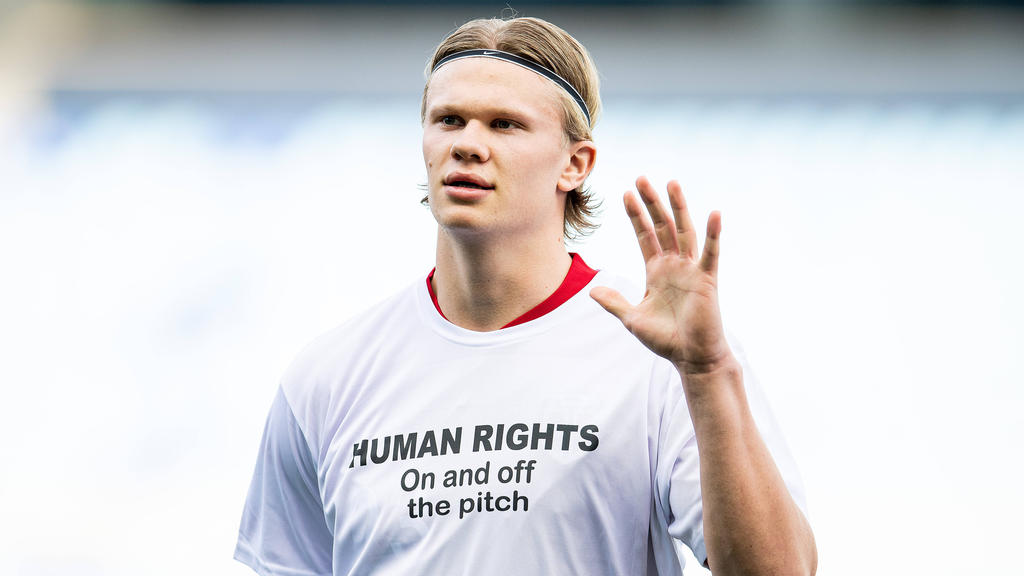Norway's football clubs to vote on Qatar World Cup boycott

Will Norwegian football star Erling Braut Haaland stay home or play on what fans have dubbed a "cemetery?" This Sunday, a meeting of Norway's football community will decide whether to boycott next year's World Cup in Qatar.
Under pressure from grassroots activists the Norwegian Football Federation (NFF) has decided to hold an extraordinary congress to decide on whether to pass up football's showpiece event all together.
The games on the pitches in the Middle Eastern emirate will "unfortunately be like playing on a cemetery," according to Ole Kristian Sandvik, spokesman of the Norwegian Supporters Alliance (NSA), invoking a commonly used metaphor among opponents of Norway's participation.
Norway, which has not qualified for a major international competition since Euro 2000, is currently fourth in its World Cup qualifying group behind Turkey, the Netherlands and Montenegro.
So while qualification seems an uphill task, the result of the vote could have an impact on whether Norway and its young star Haaland -- one of the rising stars of world football -- continue to play qualifying matches.
The movement calling for a boycott began north of the Arctic Circle when football club Tromso IL spoke out against turning a blind eye to alleged human rights abuses at the end of February.
"We can no longer sit and watch people die in the name of football," the first division club proclaimed.
Qatar has faced criticism for its treatment of migrant workers, many of whom are involved in the construction of stadiums and infrastructure for the 2022 World Cup, with campaigners accusing employers of exploitation and forcing labourers to work in dangerous conditions.
Qatari authorities meanwhile insist they have done more than any country in the region to improve worker welfare.
"There is no doubt that this World Cup should never have been awarded to Qatar," Tom Hogli, a former professional footballer turned public relations officer for Tromso IL, told AFP.
"The conditions there are abominable and many have lost their lives," he added.
In March, a spokesman for the Qatari organisers put the number of deaths on the construction sites at "three" since 2014, with another 35 having died away from their workplaces, challenging the heavy toll reported by some rights groups.
The Tromso call began gathering pace in Norway, where clubs operate under a democratic structure, and under pressure from fans, many teams now say "nei" (no).
According to Sandvik, the fans feel that the deaths on the World Cup sites would have been avoided "if they had not had to build hotels, railways and stadiums".
Nearly half of Norwegians, 49 percent, now say they are in favour of a boycott, while only 29 percent are against it, according to a poll published by newspaper VG on Wednesday.
The Nordic country's national squad has already protested conditions in Qatar, but stopped short of calling for a boycott.
Before recent Norway games, Borussia Dortmund superstar Haaland, captain Martin Odegaard and the rest of the team have worn t-shirts with slogans like "Human rights on and off the pitch."
Other countries, like Germany, the Netherlands and Denmark have also followed suit.
FIFA, on the other hand, argue that awarding the hosting of the World Cup in Qatar has opened the door to social progress.
"We know there is still work to be done, but we need to recognise the significant progress achieved in a very short time," FIFA president Gianni Infantino said in May.
While the executive committee of the NFF have said they regret Qatar being awarded the World Cup, they oppose a boycott.
President Terje Svendsen said he thought it was "not the right tool to improve the human rights situation or the working conditions in Qatar," when speaking at the federation's ordinary annual congress in March.
According to the NFF, a boycott could end up costing Norway 205 million Norwegian kroner ($24 million, 20 million euros) in fines and compensation as well as lost revenue.
Feeling the pressure from grassroots campaigns, the NFF referred the matter to an extraordinary congress which on Sunday will bring together the eight members of its executive committee, representatives of 18 districts and of hundreds of professional and amateur clubs.
The discussions will be revolve around the findings of an expert committee which, with the exception of two members representing fans, has also come out against a boycott.
"For a boycott to succeed, you need a critical mass behind it, an opposition that calls for it in the country, the UN to put pressure on the authorities, the business world, the trade unions and civil society to put pressure on it in the long term," committee chairman Sven Mollekleiv said in a debate hosted by broadcaster TV2.
"Historically, there are few successes," he said.
Rather than a boycott, the committee recommended 26 measures to consolidate and further the gains made in Qatar but also to ensure that FIFA doesn't become complicit in so called "sportswashing" -- the polishing of a country's public image through a major sporting event.
Some initial supporters of a boycott, like Tromso's Hogli, have since sided with these conclusions, although calls for a complete boycott remain.









